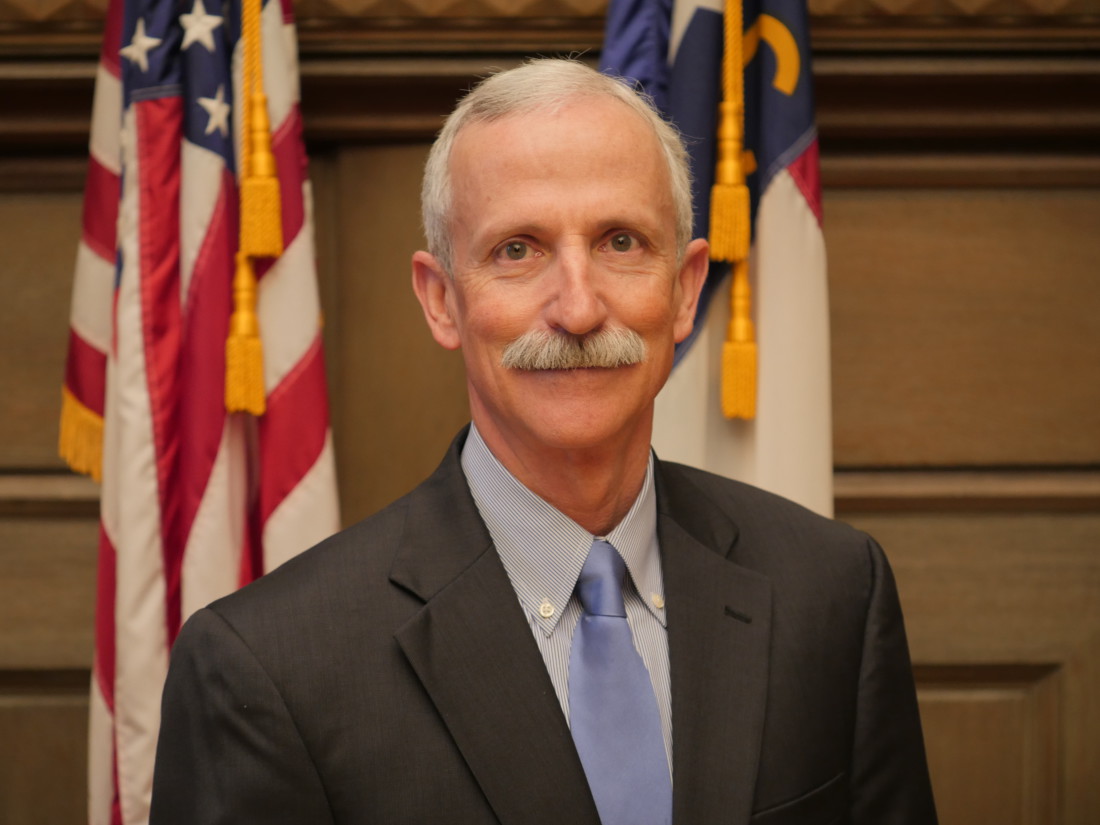The landscaping in front of the brick ranch house in East Asheville is impeccably maintained. Not a blade of grass creeps over the edge of the lawn onto the double-wide driveway, the bushes betray no twig out of place, and a strategically placed cluster of day lilies provides a subtle orange pop against the healthy backdrop of green.
The owner of this home, former Asheville City Manager Gary Jackson, projected his own fastidious image during his nearly 13 years as city government’s top employee: a smiling, clean-cut professional with well-fitting suits and a trademark gray chevron mustache. When he announced his retirement on Feb. 13, he received a standing ovation from City Council, and Mayor Esther Manheimer praised the “grace and integrity” of his service.
But on this day, no one responds to a knock on the ranch’s front door — and Jackson, who’d planned to leave his job at the end of the year, was unanimously fired by Council on March 20. In a press release titled “Asheville City Manager Gary Jackson Leaves Position,” Council wrote, “We believe that making this change now is in the city and his best interests.”
While the release provided no further details about the rationale behind Jackson’s dismissal, the move was thought to result from community anger over his handling of a police beating scandal. On Feb. 28, the Asheville Citizen-Times released a video showing former Asheville Police Department officer Chris Hickman, who is white, beating black Asheville resident Johnnie Jermaine Rush during a stop for alleged jaywalking. The incident took place in August of last year, but both Council members and Jackson himself have said they weren’t aware of the beating until the video leak.
The city is now seeking Jackson’s permanent successor. According to the published timeline, finalists are supposed to be selected the “week of Aug. 20,” with interviews to follow early next month and the successful candidate to be announced Thursday, Sept. 20. The new hire would then take over from interim City Manager Cathy Ball sometime in October or November.
But Jackson’s legacy — both the successes and the failures — will inevitably color the tenure of the next person to hold the post. And as Asheville gears up to begin a new chapter in its administration, what lessons, if any, can we learn from his time as city manager?
Into the fray
About a year before he first arrived in Asheville, Jackson had found himself at the center of a different controversy. In August 2004, he resigned from his previous job as city manager of Fort Worth, Texas, in the wake of public criticism about trash collection services and a lukewarm job review by elected officials. At the time, the Plainview Daily Herald reported that some city leaders “perceived a lack of leadership, vision and trust” in Jackson’s performance.
According to contemporary accounts from the Citizen-Times, the Asheville City Council members who hired Jackson in 2005 were aware of those issues but didn’t consider them a deal-breaker. “We understood the circumstances, and we’re very comfortable with that,” then-Mayor Charles Worley said as he announced Council’s unanimous decision to tap Jackson for the city’s top administrative job.
The details of Council’s deliberations concerning Jackson, however, are unclear. Although the closed sessions in which his hiring was discussed took place over 13 years ago and also involved several other candidates, city staff denied multiple requests for minutes of those meetings, citing privacy requirements. State law prohibits the sharing of most personnel records, but it makes an exception when the information is “essential to maintaining public confidence in the administration of city services.” On that basis, the city did release information about the Hickman-Rush incident.
Repeated emails to Worley and former Council members Terry Bellamy (who also served as mayor from 2005 through 2013) and Brownie Newman (who’s now chairman of the Buncombe County Board of Commissioners) received no response, and former Council member Holly Jones declined to comment.

Carl Mumpower, who was vice mayor at the time of Jackson’s hiring and currently chairs the Buncombe County Republican Party, remembers that the decision did not come easily. “I believe a majority of the Council’s members were seeking a manager who reflected their political persuasion and that they could manipulate to their special interests,” he says. “I did not see that as a healthy filter for hiring a city manager.”
Although Mumpower acknowledges that his more progressive colleagues’ enthusiasm for hiring Jackson “raised red flags,” he ultimately joined them in unanimously voting to confirm the new hire. “I found him to be accessible, professional, rational and helpful,” notes Mumpower, adding that he believed Jackson largely understood the importance of objective and independent city management.
But Jan Davis, a former Council member and vice mayor, says Mumpower’s memory of the process “sounds much more hostile than it really was.” Instead, Davis explains, Council was seeking a candidate with the big-city experience needed to handle Asheville’s burgeoning development and the savvy to navigate the complex legal issues surrounding the city’s water system.
“Gary was overwhelmingly the choice,” Davis says. “We liked Gary’s history with where he had come from and the huge issues that we had on the table. Development had really started flourishing at that time, and we were trying to do some innovative things, more urban-type development with less sprawl.”
Down to business
The runner-up in that personnel search, Jeff Richardson, served as Jackson’s deputy city manager from 2005-13. Now working as the county executive for Albemarle County in Virginia, Richardson says he learned a great deal from the way his boss tackled Asheville’s unique challenges.
Jackson, he maintains, “understood the dynamic stress that goes with high-growth communities who are also trying to protect high quality of life, and he navigated that quite well. The community demands an unbelievable amount from the staff and the city, and that starts at the city manager.”
Drawing on his experience in Fort Worth and other cities, Richardson recalls, Jackson could quickly generate creative options for Asheville to consider. One approach taken directly from Texas was a “one-stop shop” redesign of the city’s permitting process, which brought many different functions under a single roof to better serve developers and commercial property owners. Jackson also emphasized continual improvement in performance metrics such as permit volume and turnaround time for applications.
Davis agrees with this assessment, citing Jackson’s innovative approach to funding water system improvements and other necessary maintenance in the face of a hostile state legislature and a nationwide economic meltdown.
“Things were against us: The ability to annex went away, and the economy started failing throughout the country,” notes Davis. “He was able to lead us well through that. That’s one of his greatest legacies.”
Some of those issues, of course, are still very much present, and the next city manager will undoubtedly confront them as well.
Richardson, meanwhile, says he was also inspired by Jackson’s unconventional use of staff to gain broader perspectives on the city’s problems. One longtime emergency dispatcher, for example, found herself tapped by Jackson to handle administration and staff logistics in the high-stress City Manager’s Office.
Employees’ professional growth, notes Richardson, “doesn’t just occur going up and down the hierarchy; growth sometimes can occur by moving into areas that you’ve not been allowed to work in before.” Jackson, he points out, “was trying to build what I would call the organization’s ability to move horizontally.”
A good word?

In contrast with these accolades, however, praise from city officials and staff who worked with Jackson more recently has proved to be considerably harder to come by. In a representative response to Xpress’ many interview requests, former Council member Gordon Smith, who served alongside Jackson from 2009-17, said, “I think I’ll let others do the talking on this.”
Ball, who’s worked in city government since 1997 and was one of Jackson’s assistant city managers at the time of his firing, emailed through her assistant that she would “respectfully decline” to be interviewed. Jackson’s other assistant manager, Jade Dundas — who was demoted to capital projects director in the wake of the Rush beating scandal — said police Chief Tammy Hooper had told him about the incident days after it occurred, but that he didn’t share the information with his superior.
In a June 15 email to Xpress, Dundas said, “Information related to Mr. Jackson’s employment and accomplishments with the city would be best represented by City Council, as they were responsible for evaluating his performance and effectiveness.”
Interim Assistant City Manager Scott Burnette, whom Jackson had promoted to fire chief in 2009, also referred questions to Council members, as did Chief Financial Officer Barbara Whitehorn, who’d prepared the city’s budgets for Jackson’s approval since 2013.
When contacted for an interview, however, Council member Julie Mayfield wrote: “I really can’t see any upside to any of us talking about Gary at this point, so I’m going to decline. Sorry.” Members Keith Young and Brian Haynes did not respond to multiple requests for comment. (Xpress did not reach out to Vijay Kapoor or Sheneika Smith due to their limited time serving with Jackson.)
Current Vice Mayor Gwen Wisler, who was first elected to City Council in 2013, was more willing to express her thoughts on Jackson’s approach to his role. “I think he brought a professionalism and consistency across departments. I think that was a big cultural addition that he added to the organization,” she said. She also touted Asheville’s upgrade to a AAA bond rating and voter approval of a $74 million bond issue in 2016, both of which occurred during Jackson’s tenure.
In response to questions from Xpress, Mayor Manheimer offered a statement with similar themes. “In the over eight years I worked with Gary Jackson (as a Council member and mayor), I learned a lot about the management and the running of a city. Gary carefully balanced the ebb and flow of a changing City Council (every two years) while maintaining the strong fiscal health of the city and a commitment to continuing to improve core city services.
“The job of a city manager is challenging, to say the least,” Manheimer continued. “It’s both political and technical, yet you’ve got to stay out of the politics, and Gary did that well: He focused on the technical. Any potential city manager for the city of Asheville knows that she or he has big shoes to fill, but she or he will also inherit a house well-kept.”
The endgame
That praise, however, doesn’t seem to mesh with Council’s unanimous decision to fire Jackson in March.
Neither Manheimer nor Wisler offered comment on the specific rationale behind that move, but former Council member Cecil Bothwell, who served from 2009-17, says three of his former colleagues confirmed to him that they’d fired the city manager over the Hickman-Rush incident. Although he chooses not to name those current Council members, Bothwell says he strongly disagrees with the decision of the body as a whole.
“Jackson’s firing was a real slap in the face, and while Council members I’ve questioned flatly deny it, I think he was an easy target because he’d already announced his pending retirement,” Bothwell points out. “Council felt a need to mollify constituents upset about the police beating of an innocent black jaywalker: Jackson was their sacrificial lamb.”
Bothwell also says he spoke with Jackson over breakfast several weeks after his firing. At that time, Jackson reasserted that he hadn’t known about the beating until the video was leaked. “I believe him,” says Bothwell. “There’s no need for him to know, as long as it was all being handled correctly.”
Because Chief Hooper reported to Dundas, not Jackson, under the city’s management structure at the time, Bothwell maintains that Jackson should bear no responsibility for the incident. He also praises Hooper for following procedures and properly investigating Hickman’s actions instead of rashly firing the officer.
“The cop did something wrong, and then the chief did something right, and Gary got blamed for not telling the Council?” says Bothwell. “The only reason Council cares is because it became a hot political issue, not that it was handled wrong.”
Playing politics

During less stressful times, however, Mumpower says he observed a different dynamic between Jackson and his supervisors on Council. “Some of his decisions seemed politically motivated, and I had the sense that he was sometimes successfully manipulated by certain Council and staff members,” Mumpower explains. And though he declines to mention names, Mumpower cites parking and transit as major areas where Jackson yielded to pressure.
Instead of maintaining former City Manager Jim Westbrook’s system of using parking fees to fund and expand downtown parking capacity, Mumpower argues, Jackson allowed Council to funnel those dollars into “pretentious and unaffordable” approaches to transit. That change, he maintains, resulted in significant challenges for both parking and the bus system.
“Any responsible city manager would have recognized and identified the disastrous consequence of robbing the parking fund to pursue unsustainable transit initiatives in a city of our size, demographics and topography,” asserts Mumpower. “I’m confident Mr. Jackson understood this lack of realism, but he deferred effective managerial control of these functions to Council personalities with less talent and managerial savvy.”
Bothwell disagrees with that assessment. Jackson, he says, “knew that Council set policy, and he then followed through as best he could to make that policy happen.” Fulfilling the city’s commitment to improving transit, counters Bothwell, required Jackson to move money from the parking fund. “It was the majority on Council, and [Mumpower] wasn’t part of it. He was never a happy camper.”
On the other hand, urban designer Joe Minicozzi of Asheville’s Urban3 consulting firm believes that Jackson was the one doing the manipulating. By allowing Council members to take the lead on special interest projects they lacked the capacity to handle, he claims, Jackson could then offer assistance that left those members indebted to him concerning future decisions.
“What qualifies Julie Mayfield to be handling I-26? What qualifies Gordon Smith to be solving affordable housing, which cities 20 times our size can’t seem to solve?” asks Minicozzi. Jackson, he posits, “gives them a little bit of rope, and they go out and they fail. Then he swoops in and writes a good press release or covers up for them, and by then, they’re wrapped around his pinkie.”
Bothwell, however, doesn’t buy that characterization of Jackson’s behavior. Under his administration, says Bothwell, “I guess there were press releases about things that occurred, and I suppose they would’ve been about things that were perceived as successful, but I don’t see how he was getting [Council members] to eat out of his hand.”
Minicozzi also alleges that Jackson directly threatened his career. The reason, says Minicozzi, was his advocacy for Maxwell Street resident Reid Thompson in a long-running battle over tractor-trailer traffic serving Greenlife Grocery. And while working for Public Interest Projects on the private/public collaboration that led to the Aloft hotel and city parking garage on Biltmore Avenue, says Minicozzi, he met Jackson for breakfast at the Early Girl Eatery.
“Gary said to me, ‘When are you going to realize that your behavior is going to affect your career in this town?’” Minicozzi recalls. “I just looked at him and I said, ‘Are you threatening me?’ And he’s stirring his eggs: ‘Yeah, you could take it that way.’” The Aloft project, Minicozzi maintains, “could’ve been so much better, but I wasn’t allowed to be in those meetings with the city.”
Closed doors
Xpress was unable to ask Jackson for a response to those allegations — or, for that matter, to speak with him at all about his time in Asheville. Under the terms of his employment contract, the city is still paying Jackson’s salary; those payments, which will continue through September, will total nearly $98,000. Nonetheless, city communications specialist Polly McDaniel declined to provide his current contact information. Calls to the phone number on file for Jackson went directly to a full voice mailbox.
A letter left wedged in the screen door at Jackson’s home on Aug. 1 also received no response. “We wanted to give you the chance to speak on your own behalf about your time as city manager, to explain your approach and discuss your dismissal earlier this year,” it read, adding, “The only one who’s missing from the story is you.”
That may be debatable, given the reluctance of so many current and former city officials to discuss either Jackson’s firing or his legacy. And although there’s been no hint of corruption in city government during this period, transparency in city operations seems all the more critical in light of the corruption scandal that’s currently playing out in connection with former Buncombe County Manager Wanda Greene and others.
Corruption aside, we do know that Hickman, who resigned in January, was arrested in March on a state felony charge of assault by strangulation, plus misdemeanor counts of assault and communicating threats. Those charges are still pending, with a plea hearing set for Oct. 1. And on Aug. 3, the city reached a $650,000 settlement with Rush. Meanwhile, Jackson’s house is for sale, and it’s unclear what his future plans might be.
Thus, it appears that any final assessment of this chapter in Asheville’s recent history and what it means for the future will have to wait. In the meantime, we’re left with an ambiguous amalgam of praise, criticism and silence that may serve as both an inspiration and a caution to whoever ends up becoming the next city manager.




Doesn’t it tell you plenty that almost all of Jackson’s former subordinates (who still work at the City) offer “no comment”?
In the inner workings of City Hall, he was known as “Teflon” because “nothing sticks to Gary”. He always had a subordinate to throw under the proverbial bus.
If you want to know the truth, go find some of Gary’s bus fodder former department directors or senior managers and ask them. A few minutes on Google can net you dozens, including multiples in nearly every department. Gary went through a department director or Assistant City Manager about every six months, but no one seemed to care or question.
How about that HR Manager who got ran off so Cathy Ball could supervise her husband? I’d like to hear her opinion on Gary Jackson.
LOL no dissenting voices in the public sphere that matter. And as long as one way thinking is allowed here, with incompetent people running for election based on labels, you can’t expect this place to function properly. Asheville will go down eventually; economically, see a rise in crime, and become nothing more than an empty shell of itself. With a lot of it brought on by mismanaged money, centralized control, and rampant cronyism.
A commendable effort to knit a long legacy out of the diverse experiences of a broad group of antagonists. Commendable effort by Mr. Walton and the Mountain-X. Thank-you.
Much obliged! Now, I’m eager to see the city’s finalists for the next manager and learn how similar/different they are from Jackson in terms of background and philosophy.
Good reporting, and telling it like the riveting mystery story that it has become.
Mr. Bothwell’s comments make the most sense to me. Things were getting too hot for Mayor Manheimer and crew. They needed to do something fast to appease their base and keep them from rioting on the steps of City Hall, though everyone knew it was unreasonable and cowardly to hold the City Manager responsible.
So Robin, your comment has it upside down. It was Gary Jackson who was thrown under the bus.
Gary Jackson getting almost $100,000 to sit at the house for the year before he retires is not being thrown under the bus. In the corporate world, that’s called a golden parachute. He probably told the Council to fire him knowing that they’d have to pay him a healthy severance package. If that’s being thrown under the bus, then sign me up.
The truth is that Gary (and his crony Cathy Ball) ran off some really talented and dedicated people because they wouldn’t “kiss the ring”. They then hired more cronies and “yes men” (and women) to senior positions to cordon off their control. You never wondered why the City employees hundreds of employees, but their comments only seem to come from 2-3 of the same people?
Carl Mumpower knows what I’m talking about, but he likes to see his name in the paper, so he’ll call a half story commendable so everybody gets a trophy.
Hi Robin, I’d be happy to speak with you in more detail about Jackson’s personnel policies at any point, especially if you have specific allegations to offer. Please reach out via email at dwalton@mountainx.com if you’d like to share more.
Gary Jackson had ZERO leadership skills… Z E R O.
Let’s make sure we get a conservative city manager for once this time! SICK of nasty democrackkks criminalizing everything in the city…
Maybe Gary was thrown under the bus for the wrong reasons, but let me assure you he deserved getting kicked under the bus for his constant political trickery.
And just because the city hasn’t suffered embezzlements and briberies like the county has does not mean City Hall is not infested with malignant officials. Good riddance to the scofflaws, Gary Jackson, Billy Hogan, Bob Oast, William Anderson, and Scottie Richardson; it was a start.
Sorry, it’s not “Scottie” Richardson. I meant Jeff Richardson, who left Asheville in disgrace several years ago, during the William “Diante” Anderson scandal.
There’s no benefit to any current City employees to comment on Gary Jackson, but one can usually expect the blanket praise statements as a cop out. There’s none of that here, and people are right to connect Gary’s retirement with his orchestrated departure. That was an easy no-penalty way for Council to shift attention off themselves since he was getting paid for the remaining months in any event. All the elected officials are just playing hot potato with accountability as they always have, including the ones playing revisionist history from the sidelines. They were, and are, just trying to maintain illegal direct decision making on hiring practices while having no accountability. Should we forget the stellar former Police Chief hand picked by City Council? Should we forget all the unearned praise heaped upon Gary for years by Council? They always volunteered how he was the best City Manager in the country, all while he lost good people with decades of experience and surrounded himself with boot-licks and cronies. Anyone remember how that State treasurer found the City in default on its financial practices after Gary placed his secretary in the Finance Director position? The City’s finance department still hasn’t recovered from that cluster, and Cathy Ball still keeps paying her with taxpayer money on the side since she left years ago to go work for the Mayor. The county even considered that know-nothing briefly for their interim County Manager slot. Talk about worse to even worse. I wonder if they’ll keep it all in the family and have that one on the list for consideration. Whoever they go with, you know it will be whoever promises to do Council’s bidding the most and meets their pre-ordained demographics. God help us all.
Asheville has no effective leadership and decades of non leadership shows everywhere you look around the city …
Either you think you could do better, in which case the filing fee remains at $75, or you don’t, in which case you’re just part of the peanut gallery.